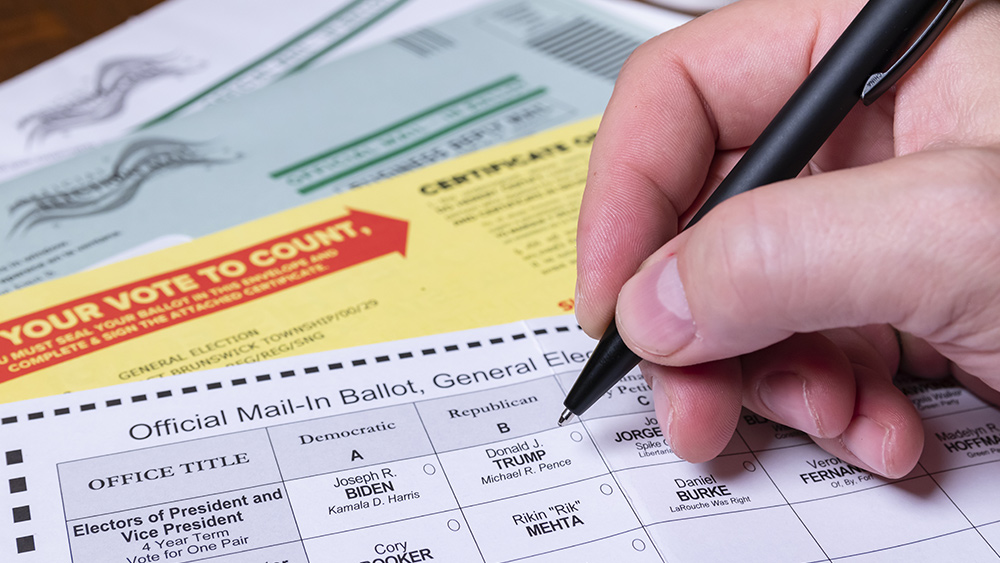British police secretly using U.K. passport database to conduct facial recognition searches
01/10/2024 / By Arsenio Toledo

Police forces in the United Kingdom have been secretly using the United Kingdom’s database of 46 million British passport holders to conduct facial recognition searches.
This is according to an investigation by British media outlet the Telegraph and British investigative journalism firm Liberty Investigates. They found that British police forces have conducted hundreds of illegal facial recognition searches using the passport database since at least 2019 – and searches have ramped up in recent months. (Related: Millions of U.K. students are using BIOMETRICS for school-related activities without parental consent.)
The Telegraph and Liberty Investigates uncovered data from the British Home Office through Freedom of Information requests that British police used facial recognition technology on the passport database more than 300 times just in the first nine months of 2023. British police also used facial recognition tech to conduct searches on the U.K. immigration database, which holds information on foreign nationals in the country.
Facial recognition searches match the biometric measurements in an identified photograph, such as those contained on passports or even driver’s licenses, to those of images picked up elsewhere.
The use of such technology has sharply increased in recent years, and British police already routinely conduct thousands of searches annually using the Police National Database. This database holds around 16 million images of people who have been arrested, including hundreds of thousands of people who were detained but never charged or were cleared of offenses.
British government quietly changing law to make facial recognition searches legal
To make the British police’s activities legal, the country’s government is quietly attempting to change the law to make facial recognition searches on the country’s database of driver’s licenses legal.
British Minister of Crime and Policing Chris Philp first raised the possibility of allowing officers to access the database in early 2023, claiming that it would allow them to easily identify suspects in burglaries, thefts and shoplifting.
According to the proposed legislation, should police want to put a name to an image in their file – either captured on CCTV, shared on social media or provided to police directly – a facial recognition search would allow them access to the database.
The proposal is being snuck into a single clause in a new criminal justice bill making its way through the British parliament, the House of Commons. The intention to allow the police to exploit government databases is not explicitly referenced in the main sections of the bill nor even in its explanatory notes, which has raised strong criticism from privacy activists.
“The data [on U.K. databases] was not provided for these purposes,” warned former cabinet minister David Davis, who said there was “no explicit legislative basis” for using facial recognition technology in such a manner in the United Kingdom. “For the police to act like this undermines the data relationship between the citizen and the state. At the very least, the House of Commons should be informed precisely who authorized this and who carried it out.”
Madeleine Stone, senior advocacy officer for the privacy campaign group Big Brother Watch, noted that it was “deeply concerning” that passports and driver’s licenses could be used for facial recognition searches.
“There is no clear legal basis for this intrusive technology,” she said. “We urgently need a democratic, lawful approach to the role of facial biometrics in Britain.”
The Metropolitan Police – the main police force responsible for the Greater London area – conducted almost one in three police passport searches in the first nine months of 2023. A spokesman for the police claimed using facial recognition searches was necessary to solve many serious cases.
“Retrospective facial recognition is used after a crime has taken place as part of an investigation to try and identify who a person is,” said the spokesperson. “This technology significantly helped progress numerous investigations including those for murder, rape and assault. We use a number of methods to try to identify suspects, in a small number of cases we will work with other organizations who may be able to assist us.”
Peter Fussey of the University of Essex and a former independent review of the Met’s use of facial recognition warned that there was insufficient oversight of the police’s use of facial recognition searches. He and other activists warn that current technology is prone to falsely identifying non-White faces.
“This constitutes another example of how facial recognition surveillance is becoming extended without clear limits or independent oversight of its use,” said Fussey. “Such technologies are useful and convenient. That police find such technologies useful or convenient is not sufficient justification to override the legal human rights protections they are also obliged to uphold.”
Watch this Dec. 7, 2023 episode of “Unmasking the Narrative” with host Aida Reva, who discusses how the proliferation of artificial intelligence is making facial recognition technology even more dangerous.
This video is from the People for People Radio channel on Brighteon.com.
More related stories:
Biometric data and surveillance: DNA being eyed as the “ultimate global ID.”
EU visitors will soon be subject to facial scans and fingerprinting under new initiative.
DIGITAL PRISON: ALDI grocery stores in London now requiring digital, cashless purchases.
Sources include:
Submit a correction >>
Tagged Under:
big government, computing, conspiracy, cyber war, data collection, deception, Facial recognition, facial scans, future tech, Glitch, information technology, insanity, national security, outrage, passports, police state, police surveillance, policing, privacy watch, surveillance, traitors, treason, Tyranny, United Kingdom
This article may contain statements that reflect the opinion of the author
RECENT NEWS & ARTICLES
COPYRIGHT © 2017 GLITCH.NEWS
All content posted on this site is protected under Free Speech. Glitch.news is not responsible for content written by contributing authors. The information on this site is provided for educational and entertainment purposes only. It is not intended as a substitute for professional advice of any kind. Glitch.news assumes no responsibility for the use or misuse of this material. All trademarks, registered trademarks and service marks mentioned on this site are the property of their respective owners.





















